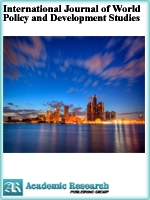International Journal of World Policy and Development Studies
Online ISSN: 2415-2331
Print ISSN: 2415-5241
Print ISSN: 2415-5241
Quarterly Published (4 Issues Per Year)

Archives
Volume 2 Number 2 February 2016
Interface between Local Actors, Livelihoods and Conservation around the Kivu Lake Watershed in the African Great Lakes Region
Authors: Ngome-Tata Precillia Ijang ; Mveme Mireille ; Cleto Ndikumagenge ; Nso Ngang Andre
Pages: 7-14
Abstract
This paper sets out to portray the complexity of stakeholders, the views associated with them, and the tensions between livelihoods and conservation interests in the Africa Great lakes region. Through an exploratory study and field visits carried out between 2006 and 2012, this study analyses the various socio-economic and politico-institutional arenas impacting on the Kivu Lake watershed with the objective of identifying a win-win scenario for conservation and livelihoods. Drawing on the institutional theory, emphasis was laid on analyzing the structure and forms of institutions, the existing arrangements, and the ways in which these shape access to, use and management of resources. It depicts institutions as social networks (endowment, capability and entitlement) using the case of HELPAGE and the HIMO approach. Overall, this study has demonstrated how many happenings (resource characteristic, political and social processes and various institutional arrangements) contribute to the tensions between conservation and livelihoods. It has also shown that although field efforts try to set a balance between the two processes, for instance through the agroforestry project, many other agendas undermine these efforts such as the scattered and uncoordinated actions of field actors and the multiplicity of resource users’ group. This paper has proposed some guiding rules emanating from the implementation of the HIMO program that if applied, will reduce conflicts between communities and projects.



